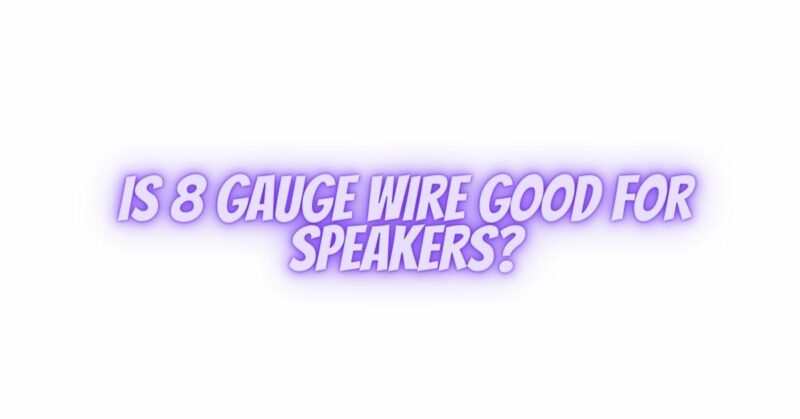Selecting the appropriate speaker wire gauge is essential for optimizing audio quality and ensuring your speakers receive the necessary electrical current to produce clear and powerful sound. While 8-gauge wire is a suitable option for certain applications, whether it’s good for your speakers depends on your specific setup and requirements. In this article, we’ll explore the considerations surrounding the use of 8-gauge speaker wire.
Understanding Speaker Wire Gauge:
Speaker wire gauge refers to the thickness or diameter of the wire. Lower gauge numbers represent thicker wires. As wire thickness increases, so does its ability to carry electrical current effectively. Different gauges are used for various audio setups, and the choice of gauge depends on factors like speaker impedance, power requirements, and cable length.
When Is 8-Gauge Wire Suitable for Speakers?
- High-Power Systems: 8-gauge wire is well-suited for high-power audio systems, such as home theater setups, powerful stereo configurations, or installations where speakers demand significant electrical current. These systems benefit from the enhanced current-carrying capacity of thicker wire.
- Long Cable Runs: When speaker wire needs to be run over longer distances, thicker wire like 8-gauge can help reduce voltage drop, ensuring that the speakers receive adequate power. This is especially important when cable runs exceed 30 feet (9 meters).
- Low-Impedance Speakers: Speakers with lower impedance ratings (typically 4 ohms or less) draw more current from the amplifier. Thicker wire can handle this increased current flow more effectively, preventing overheating and signal loss.
- High-Power Amplifiers: If your audio system employs powerful amplifiers capable of delivering substantial current to the speakers, 8-gauge wire can effectively handle the power without causing resistance-related issues.
Advantages of 8-Gauge Speaker Wire:
- Low Resistance: Thicker wire has lower electrical resistance, resulting in reduced signal loss and distortion. This contributes to cleaner and more accurate audio reproduction.
- Reduced Voltage Drop: Over long cable runs, thinner wires can experience significant voltage drop, leading to a loss of power at the speakers. 8-gauge wire minimizes this drop, ensuring the speakers receive the intended power.
- Higher Power Handling: 8-gauge wire is capable of handling higher power levels without overheating or causing damage to the wire itself. This is crucial when using powerful amplifiers or driving speakers that demand substantial power.
Considerations for Using 8-Gauge Wire:
- Proper Terminations: Ensure that you use appropriate connectors and terminations on the wire ends to make secure connections with your speakers and amplifiers.
- Secure Installation: When routing the wire, secure it properly to prevent damage, tripping hazards, or interference with other equipment. Use cable clips or channels to secure the wire neatly along its path.
- Avoid Sharp Bends: Sharp bends or kinks in the wire can affect signal transmission. Opt for gentle curves and gradual bends when routing the wire.
- Labeling: If you’re running multiple wires for different channels or speakers, consider labeling the wires to simplify future troubleshooting or reconfiguration.
Conclusion:
8-gauge speaker wire can be an excellent choice for audio systems that require high power, long cable runs, or have low-impedance speakers. Its low resistance, reduced voltage drop, and high power handling capabilities make it a reliable option for ensuring optimal audio performance. However, the suitability of 8-gauge wire for your speakers depends on your specific setup and power requirements. Careful consideration of your audio system’s needs and proper installation techniques are essential for maximizing the benefits of using 8-gauge wire.


